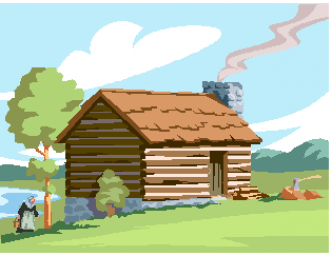Settlement
Settlers came to this area to build farms. They found the land difficult to plant in. It was difficult to dig in because of the thick root system. Trees were not a problem because the area was mostly open grassland. When settlers came, they traded goods with the Potawatomi tribe to get food and animal skins. After a while, the Potawatomi were forced to move when homesteaders started taking over the land.
Here is what one woman wrote about her trip to live in Illinois.
I have walked for such a long time. I just hope that everything will be good when I get there. On Friday evening, after we got to Paris, Illinois, we kept going into the prairie. We drove for 14 miles. The sun was setting, but it was still hot. It was good for most of the way. Though, we slipped a couple of times. The doctor got stuck and the oxen had to draw his wagon out twice. The prairies are so beautiful. There are so many different kinds of flowers that grow on them, and I love the prairie hens. One of the men in our group shot a hen for us to eat yesterday. Eliza looks sick still but she says she feels like helping me prepare dinner. Oh, dear, I think it will be a hard time still. On Saturday, the 15th, we traveled in both prairie and forest. We got lost. We took the wrong road and were lost in the prairie grass for a long time. Sometimes the grass comes up as high as the horses’ backs. When night came, we cut some of the grass. Then, we pitched our tents. We tried to make ourselves as comfortable as possible, even though there were many mosquitoes.
Here is what one woman’s life was like after settling.
The woman told me that she makes all of the thread and then sews all of the clothes for her family from the cotton and wool that they make. She also knits all the socks. Her husband makes the shoes. He was not a shoemaker originally, but he learned. She makes the soap and the candles that they use. She also makes sugar from the sugar-trees on their farm. All that she wants to buy is coffee and tea. They make money when she sells her butter and her chickens in the market. They don’t use any wheat, or sell any of their corn. It seemed like they had a lot of corn. But, she said it was not more than they needed to make some bread and cakes. They also use it to feed their animals in the winter.
Here are some of the problems these settlers faced each season.
Fall — There was a constant threat of fire. When the prairie grass became very dry, a spark could start a fire that would burn the prairie and sometimes their cabins.
Winter — The freezing cold and deep snow were problems. People got lost in the drifts or out on the prairie when the trails were covered.
Spring — The rains and the melted snow were problems. The prairie became swampy when the snow melted and the rains started and people would get stuck on the muddy tracks.
Summer — The heat was a problem. Some days were very hot and there was no shady forest to sit and cool down in; there were also so many insects that sometimes horses died from so many stings.
